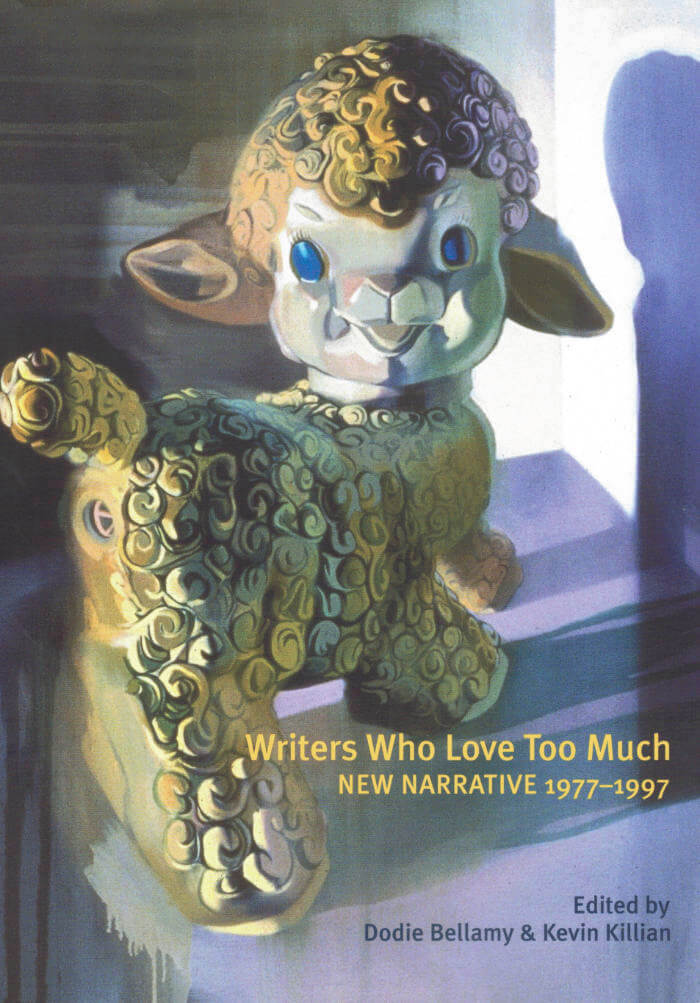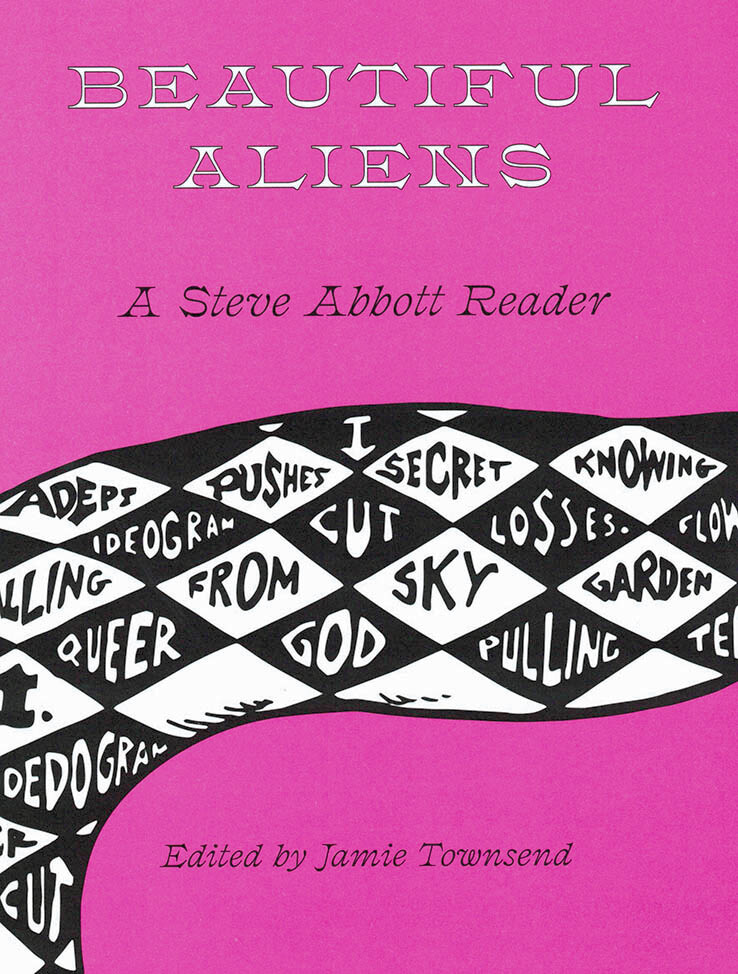Bruce Boone
Bruce Boone

Century of Clouds
This edition restores to print a central text of the New Narrative movement, founded in San Francisco by Boone and Robert Gluck in response to the stagnation of contemporary experimental poetry of the late 1970s. Wishing to bring the vigor and energy of the gay rights and feminist movements, Bruce Boone’s writing of the late 1970s is as fresh, funny, witty, and self-reflexive as it was thirty years ago. First published in 1980, Century of Clouds, based on Boone’s experiences at the summer meeting of Marxism and Theory Group in St. Cloud, Minnesota, takes up issues of sexuality, political and theoretical identity, religion, and friendship in the characteristically rich and varied writing of the New Narrative movement.

Bruce Boon Dismembered
Bruce Boone Dismembered collects nearly five decades of writing by Bruce Boone, a founder of New Narrative and critical figure at the crossroads of late-twentieth-century avant-garde and social movement writing. At once sexy and political, gossipy and scholarly, this crucial volume includes poems, stories, essays, interviews, and reviews.
In a time of disorder and disease, Boone’s body of work acts as a mirror to our dismembered global reality. This scavenged, collaged, taped-together collection provides a “map to negotiate perils” and guides us toward reconciliation with perilous futures. This book exemplifies the poignancy that might emerge from the found and frenetic.
And more

Tripwire 15 - Narrative/Prose
Narrative/Prose issue, featuring a special section: I was writing, but it was drawing: a Renee Gladman mini-feature with work by Renee Gladman * Earl Jackson, Jr. * Bruna Mori * Alexis Almeida on Renee Gladman & Julie Carr * Lewis Freedman & Vanessa Thill on Renee Gladman & Mirtha Dermisache. as well as work by Isabel Waidner * sissi tax (translated by Joel Scott & Charlotte Theißen) * Susan Hefuna * Mira Mattar * Lital Khaikin * Maryam Madjidi (translated by Ruth Diver) * Omer Wasim & Saira Sheikh * Ilse Aichinger (translated by Christian Hawkey & Uljana Wolf) * Bronka Nowicka (translated by Katarzyna Szuster) * Maude Pilon (translated by Simon Brown) * Mehmet Dere * Syd Staiti * Jena Osman * Germán Sierra * Natani Notah * Julia Bloch on Bernadette Mayer * Robert Glück on Clarice Lispector * Rob Halpern on Bruce Boone & Dennis Cooper *Dylan Byron on/after Bruce Boone * Linda Bakke on Communal Presence: New Narrative Writing Today * Anna Fidler * Corey Zielinski on Bob Glück & Writers Who Love Too Much: New Narrative 1977-97 * Jackie Kirby on From Our Hearts to Yours: New Narrative as Contemporary Practice * David W. Pritchard on Kevin Killian * Dale Enggass on Simone White * Allison Cardon on Anne Boyer * Robert Balun on Leslie Kaplan * Marco Antonio Huerta on Omar Pimienta * Allison Grimaldi Donahue on Josué Guébo * Sara Florian on Lasana Sekou * Louis Bury on Allison Cobb * Hugo Gibson on Annie Ernaux.

I, Boombox
Robert Glück's new book I, Boombox is a long poem fashioned from the author's misreadings. In that sense, it's a queer autobiography in which Glück dreams on the page.
"Rimbaud infamously claimed that I is an other, but for Bob I is a flicker of error, or a wandering ear that invents. He has made a home for several decades of errant listening in this sinuous long poem, which light heartedly teases the modernist tradition it also subverts. In true mock-heroic manner, Bob reveals from his gay marble desk how God's laughter glides in and out of garden festival, action film, and sublet alike. I have been waiting for this book for years and it sweetly exceeds all of my hopes."—Lisa Robertson
"In I, Boombox, Robert Glück makes it clear that dreams are as real as the spurts of sentences we use to discover them. Scoring the 'umbilical/indescribabilia' that accompanies unconscious feeling into a thin strip of thickly montaged verse, the 'invisible speakers' that populate Glück's poem—their misreadings and cant half-truths, their headlines and lies—turn dream's content into poetic foam. In this mind's eye—the 'suburb' is blithely rendered into a thing 'superb, ' and 'loneliness' roars with the face of a 'lioness /and intimacy.' I, Boombox is a poem of frothy divinations tempered by the slapstick of speech. It suggests that desire without sense is desire nevertheless—and this is a delight to understand."—Shiv Kotecha
Winner of the Gertrude Stein Award for Innovative Poetry in English.
Robert Glück served as director of San Francisco State University's The Poetry Center, co-director of Small Press Traffic Literary Center, and associate editor at Lapis Press. His books include two novels, Jack the Modernist and Margery Kempe, two books of stories, ELEMENTS OF A COFFEE SERVICE and Denny Smith, a book of poems, Reader, and with Kathleen Fraser, a book of prose poems, In Commemoration of the Visit. With Bruce Boone, Glück translated La Fontaine for a book of that name. With Camille Roy, Mary Berger, and Gail Scott, he edited Biting the Error: Writers on Narrative. Glück prefaced Between Life and Death, a volume of Frank Moore's paintings, and, with artist Dean Smith, made the film Aliengnosis, based on readings from I, Boombox. Other books include Communal Nude: Collected Essays, and Parables, an editioned artist book with Cuban artists José Angel Toirac and Meira Marrero D'az. Margery Kempe was republished by NYRB Classics in 2020 and his novel About Ed by NYRB in 2023.

Writers Who Love Too Much: New Narrative 1977-1997
This long overdue anthology of New Narrative includes both classic New Narrative texts and rare supplementary materials, allowing the movement fueled by punk, pop, porn, French theory, and social struggle to bound back to life, ripe with dramatic propulsion, to form a new map of late 20th century creative rebellion.
"Gossipy and uninhibited, its breath is hot in your ear. It wants to tell you everything, and it wants you to overshare back." — M. Milks
"One of New Narrative's all-time best jokes is about the movement itself. It's the parodic motto that Bellamy formulates in Academonia for New Narrative "at its worst" "I have sex and I'm smarter than you." But "sex without fantasy," Camille Roy posits, "is nothing." The pieces compiled in Writers Who Love Too Much don't restrict fantasy. They use, as Boone says, eros, rather than facts, as the matter of narrative. Sex and fantasy are for New Narrative the stuff of ordinary life." — Jean-Thomas Trembla
Contributors include: Steve Abbott, Kathy Acker, Michael Amnasan, Roberto Bedoya, Dodie Bellamy, Bruce Benderson, Charles Bernstein, Nayland Blake, Bruce Boone, Lawrence Braithwaite, Rebecca Brown, Kathe Burkhart, Marsha Campbell, Dennis Cooper, Sam D'Allesandro, Gabrielle Daniels, Leslie Dick, Cecilia Dougherty, Bob Flanagan, Robert Glück, Judy Grahn, Brad Gooch, Carla Harryman, Richard Hawkins, Ishmael Houston-Jones, Gary Indiana, Edith A. Jenkins, Kevin Killian, Chris Kraus, R. Zamora Linmark, Eileen Myles, John Norton, F.S. Rosa, Camille Roy, Sarah Schulman, Gail Scott, David O. Steinberg, Lynne Tillman, Matias Viegener, Scott Watson, Laurie Weeks.

Beautiful Aliens: A Steve Abbott Reader
Beautiful Aliens: A Steve Abbott Reader is a landmark collection representing the visionary life's work of beloved Bay Area luminary Steve Abbott. It brings together a broad cross-section of literary and artistic work spanning three decades of poetry, fiction, collage, comics, essays, and autobiography, including underground classics like, Lives of the Poets and Holy Terror, rare pieces of treasured ephemera, and previously unpublished material, representing a survey of Abbott's multivalent practice, as well as reinforcing his essential role within the contemporary canon of queer arts.
"Holy Terror is good reading, well written and extremely knowledgeable about the subject of magic black and white. In fact, all magic is both."—William Burroughs
"All of us who knew the late Steve Abbott will now be happy that the stone has rolled back, to reveal the amazing accomplishment of Beautiful Aliens, poet Jamie Townsend's masterful take on Steve's multigenre work. Prose, poetry, journalism, the essay, the comic book, the novel: Steve was driven to try his hand at all these categories, excelling more often then you'd think possible. It's time that people knew a genius (of sorts) once lived at the corner of Haight and Ashbury." — Kevin Killian
Steve Abbott (1943-1992) was a poet, critic, editor, novelist and artist. Abbott was raised in Lincoln, Nebraska, graduated from the University of Nebraska, and attended Emory University where he was an organizer for Atlanta's Gay Liberation Front and the gay lib editor at the underground paper The Great Speckled Bird. Abbott moved to San Francisco in 1974 where he became was a frequent contributor to local publications, including The Advocate, The Sentinel, and the Bay Area Reporter. He was also one of the founding editors of the literary arts newsletter Poetry Flash and the publisher/editor of the literary journal Soup. Steve wrote a number of books of poetry and prose during the 1980s and early 90s including: "Wrecked Hearts", "Stretching the Agape Bra", "Lives of the Poets", "Holy Terror", "Skinny Trip to a Far Place", and "View Askew: Postmodern Investigations", a book that collects Steve's essays from The San Francisco Sentinel, The Advocate, and the arts journal Mirage. He was active in various reading series and discussion groups in the Bay Area, including Cloud House and Small Press Traffic, and, in 1981, he co-organized the historic Left/Write conference. Steve was also a respected critic and the first to use the term "New Narrative" to describe the work of contemporaries including Bruce Boone and Robert Glück. Abbott died of complications due to AIDS on December 2, 1992. His novel The Lizard Club was published posthumously. Jamie Townsend is a genderqueer poet, publisher, and editor living in Oakland, California. They are half-responsible for Elderly, a publishing experiment and persistent hub of ebullience and disgust. They are the author of several chapbooks including, most recently, Pyramid Song (2018) as well as the full-length collection SHADE (2015). An essay on the history of the New Narrative magazine Soup was published in The Bigness of Things: New Narrative and Visual Culture (2017).
Published December 2019.